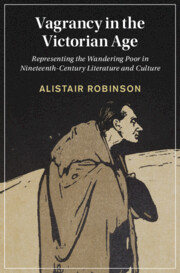 Vagrancy in the Victorian Age
Vagrancy in the Victorian Age from Part I - The Country
Published online by Cambridge University Press: 02 November 2021
Most actual poachers were not vagrants in the Victorian period; but a significant number of literary ones were, especially during the so-called Hungry Forties. Examining popular and literary sources from across the political spectrum, this chapter argues that the vagrant poacher became a politically loaded figure in British print culture during the 1840s. In the conservative ‘poacher’s progress’ the poacher’s vagrancy was a sign of selfishness and a staging post on the road to ruin. These morality tales supported the landowning elite and their monopoly on game by depicting the poacher as a predatory criminal. Meanwhile, in radical literature, such as Charles Dickens’s The Chimes (1844), the poacher was represented as a victim of permissive laws; these included both the vagrancy laws and the game laws. In these texts the poacher’s vagrancy was a sign of social oppression and was used to critique what many liberals and radicals perceived as the criminalisation of poverty. Alongside Dickens, this chapter examines Charles Kingsley’s Yeast (1848) as well as works by Hannah More and Charlton Carew.
To save this book to your Kindle, first ensure [email protected] is added to your Approved Personal Document E-mail List under your Personal Document Settings on the Manage Your Content and Devices page of your Amazon account. Then enter the ‘name’ part of your Kindle email address below. Find out more about saving to your Kindle.
Note you can select to save to either the @free.kindle.com or @kindle.com variations. ‘@free.kindle.com’ emails are free but can only be saved to your device when it is connected to wi-fi. ‘@kindle.com’ emails can be delivered even when you are not connected to wi-fi, but note that service fees apply.
Find out more about the Kindle Personal Document Service.
To save content items to your account, please confirm that you agree to abide by our usage policies. If this is the first time you use this feature, you will be asked to authorise Cambridge Core to connect with your account. Find out more about saving content to Dropbox.
To save content items to your account, please confirm that you agree to abide by our usage policies. If this is the first time you use this feature, you will be asked to authorise Cambridge Core to connect with your account. Find out more about saving content to Google Drive.